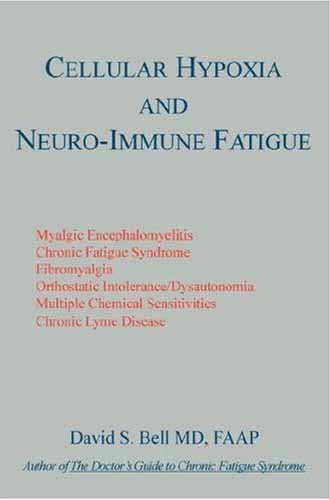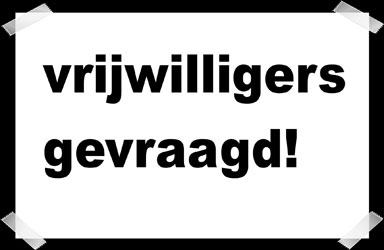CHRONIC FATIGUE SYNDROME, Fibromyalgia, Multiple Chemical Sensitivities, Myalgic Encephalomyelitis, Orthostatic Intolerance, Chronic Lyme Disease, Transformed Migraine make up a spectrum of illnesses characterized by reduction in daily activity, severe fatigue, widespread pain, and numerous other symptoms. Despite severe and sometimes disabling symptoms, the affected patient looks relatively well.
In this book a mechanism is presented arguing that these illnesses are characterized and defined by decreased cellular energy production, or cellular hypoxia. The term Neuro-Immune Fatigue is suggested for this spectrum of conditions. This is not a book that describes the signs and symptoms of the illnesses in this spectrum; it is a book that explores mechanisms that lie beneath the complex patterns of symptoms.
Excerpt from Dr. Bell’s Lyndonville News,
August 2007:
Well, the book is finished. And it carries the awkward title of Cellular Hypoxia in Neuro-Immune Fatigue. Don’t panic. While this is a somewhat intimidating title, I hope that by reading it, persons interested in FM/CFS/ME will get a picture of where the science is leading in the past few years. It may seem like a jump, but we are all a little beyond the standard description of symptoms.
It is not a book for rookies and has little introductory material, meaning that it should not be given to aunt Tille who needs to learn about CFS. It is a small book, only 120 pages, but I hope that by leaving out tons of scientific detail, the concepts about what takes place inside the cell may become clear. It describes a theory that fibromyalgia and ME/CFS are parts of a spectrum of illnesses, called here Neuro-Immune Fatigue, and that the common end pathway of these illnesses is a dysregulation of cellular metabolism leading to the inability of the cell’s mitochondria to utilize oxygen.
Lost already? I have tried in this book to make these concepts as reader friendly as possible. And the material is not new. Drs Martin Pall and Paul Cheney and others have been talking about this for years. I do think that the whole confusing conglomeration of ME, CFS, chemical sensitivities, fibromyalgia, orthostatic intolerance, chronic Lyme disease is ready to be understood with the science we have today. If no one should ever buy this book, I will be content. I really wrote it to sort out my own thinking on the subject. And in the process I hope this will be useful to others. My life’s dream will be fulfilled if it helps scientists and clinicians make the next step in what I perceive to be the direction the research is heading. For those of you who are interested, in past issues of the Lyndonville News a few first drafts of chapters were presented. (Available free at http://www.davidsbell.com/DSBNewsletters.htm)
Toelichting door Frank Twisk:
Hypoxia staat voor zuurstoftekort in de cellen. De mitochondria (energiecentrales in de cel) zijn niet in staat zijn zuurstof om te zetten in energie. Hypoxia is de meest voorkomende oorzaak van celschade en celdood en speelt volgens Bell een rol in een scala aan ziekten: ME/CVS, ziekte van Lyme, fibromyalgie, MCS etc.
Die verlaagde opname van zuurstof door de cellen (bij inspanningstesten wordt de totale zuurstofopname gemeten) kan een gevolg zijn van schade aan de mitochondria (produktiefaciliteiten defekt). De meest voor de hand liggende verklaring voor deze schade is de oxidatieve stress (vrije radikalen), zoals door Pall, de Meirleir, Cheney en anderen beweerd wordt.







